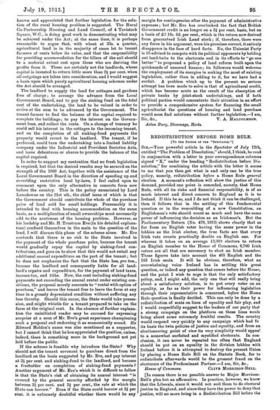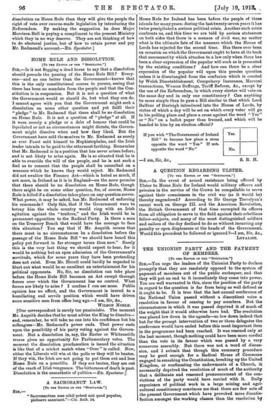REDISTRIBUTION BEFORE HOME RULE. [To THE EDITOR OP TRY "SPECTATOR."]
Sra,—Your powerful article in the Spectator of July 12th, entitled " The Problem of Dissolution," should, I think, be read in conjunction with a letter in your correspondence columns signed " X," under the heading "Redistribution before Dis- solution," for combining the article with the letter it seems to me that you then get what is and only can be the true policy, namely, redistribution before a Home Rule general election. A moment's reflection will show the justice of this demand, provided one point is conceded, namely, that Home Rule, with all its risks and financial responsibility, is of as much interest and direct concern to England as it is to Ireland. If this be so, and I do not think it can be challenged, then it follows that in the settling of this fundamental question or in the remoulding of a new Constitution, an Englishman's vote should count as much and have the same power of influencing the decision as an Irishman's. But the Parliamentary Return (No. 478, 1913) shows clearly that so far from an English voter having the same power in the lobbies as the Irish elector, the true facts are that every Irish vote counts practically double an English one. For whereas it takes on an average 13,000 electors to return an English member to the House of Commons, 6,700 Irish voters are all that are necessary to elect an Irish member. These figures take into account the 465 English and the 103 Irish seats. It will be obvious, therefore, what an overwhelming voice Ireland has in settling this great question, or indeed any question that comes before the House, and the point I wish to urge is that the only satisfactory policy, and, I might add, the only one that will really bring about a satisfactory solution, is to put every voter on an equality, as far as their power for influencing legislation through their representative is concerned, before the Home Rule question is finally decided. This can only be done by a redistribution of seats on lines of equality and fair play, and I would respectfully suggest to the leaders of our party that a strong campaign on the platform on these lines woula bring about some extremely fruitful results. The country would respond very quickly to any campaign which had fo its basis the twin policies of justice and equality, and from an electioneering point of view its very simplicity would appeal to a somewhat surfeited and mystified electorate. In con• elusion, it can never be repeated too often that England should be put on an equality in the division lobbies with Ireland before it is attempted to destroy the present Union by placing a Home Rule Bill on the Statute Book, for to redistribute afterwards would be the grossest fraud on the electorate of the Predominant Partner.—I am, Sir, Ace., [In reason there is no possible answer to Major Morrison- Bell's plea but an affirmative. In practice, however, we know that the Liberals, since it would not suit them to do electoral justice to England, and since they have the power to deny that justice, will no more bring in a Redistribution Bill before the dissolution on Home Rule than they will give the people the right of veto over caucus-made legislation by introducing the Referendum. By making the suggestion he does Major Morrison-Bell is paying a compliment to the present Ministry which they in no way deserve. They are not thinking of how to do electoral justice, but of how to retain power and pay Mr. Redmond's account. —En. Spectator.]











































 Previous page
Previous page